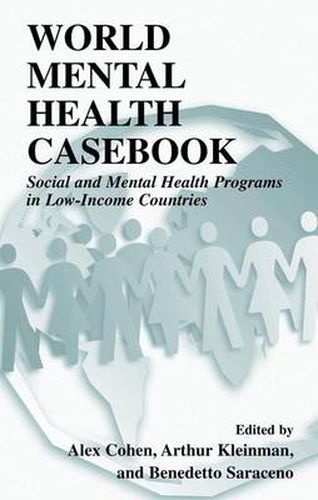Readings Newsletter
Become a Readings Member to make your shopping experience even easier.
Sign in or sign up for free!
You’re not far away from qualifying for FREE standard shipping within Australia
You’ve qualified for FREE standard shipping within Australia
The cart is loading…






This title is printed to order. This book may have been self-published. If so, we cannot guarantee the quality of the content. In the main most books will have gone through the editing process however some may not. We therefore suggest that you be aware of this before ordering this book. If in doubt check either the author or publisher’s details as we are unable to accept any returns unless they are faulty. Please contact us if you have any questions.
In 1974, the World Health Organization began research on the effectiveness of mental health services in the developing world. Through their efforts they found that treatment methods were extremely limited in their usefulness and, in some cases, even inappropriate and harmful. Little has changed in the last quarter century of the 20th century, but the research in these countries has shown that psychological need often stems from poor physical conditions. Elements including social and economical inequalities, gender discrimination, political violence and malnutrition and poor physical health all contribute to the social and psychological decay of both individuals and communities. The goal of the WHO is to document previous studies on communities of developing countries and to build on this information in order to move forward in research. Using real cases based in the South Pacific, Asia, South and Latin America and Europe, this volume sets out examples of community-based interventions that have succeeded by implementing: outreach to the families and community to identify those in need; reliable and adequate drug supplies; treatment interventions; and healthy psychosocial environments.
$9.00 standard shipping within Australia
FREE standard shipping within Australia for orders over $100.00
Express & International shipping calculated at checkout
This title is printed to order. This book may have been self-published. If so, we cannot guarantee the quality of the content. In the main most books will have gone through the editing process however some may not. We therefore suggest that you be aware of this before ordering this book. If in doubt check either the author or publisher’s details as we are unable to accept any returns unless they are faulty. Please contact us if you have any questions.
In 1974, the World Health Organization began research on the effectiveness of mental health services in the developing world. Through their efforts they found that treatment methods were extremely limited in their usefulness and, in some cases, even inappropriate and harmful. Little has changed in the last quarter century of the 20th century, but the research in these countries has shown that psychological need often stems from poor physical conditions. Elements including social and economical inequalities, gender discrimination, political violence and malnutrition and poor physical health all contribute to the social and psychological decay of both individuals and communities. The goal of the WHO is to document previous studies on communities of developing countries and to build on this information in order to move forward in research. Using real cases based in the South Pacific, Asia, South and Latin America and Europe, this volume sets out examples of community-based interventions that have succeeded by implementing: outreach to the families and community to identify those in need; reliable and adequate drug supplies; treatment interventions; and healthy psychosocial environments.